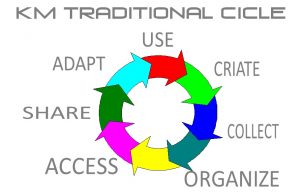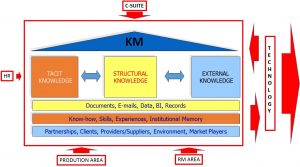KM – CROSS-FUNCTIONAL PROCESS
I always like to mention the pragmatic approach quoted by Patrick DiDomenico in his book KM for Layers: “Knowledge Management is related to deliver the correct information to the right professional in the shortest period of time.”
Likewise, I always restate and reinforce the pragmatic objectives of that matter , which are the productivity and efficiency increase in all productive processes, with the consequent increase in competitiveness and profitability (in addition to the traditional collection, maintenance and sharing of the entrepreneurial knowledge).
In the law business, the so-called “expertise” (which is nothing else, but knowledge) clearly defines the capacity of charging fees and also the degree of the acknowledgment by partners and the market, enabling some specialized attorneys to charge GBP 1.500,00 per hour in London and R$ 9.000,00 per hour here in Brazil!
Well, so how to achieve higher degrees of knowledge, productivity and profitability, making all this to become accessible? In theory, it may be simple, that is, all we need to do is to implement the cycle below:
 In practice, as usual, it is not as simple as this, because, in order to obtain this cycle, two fundamental things are necessary: – (i). the company (or the firm) needs to have or to implement the so-called “learning organization” culture, where all the members have in mind that they are under constant learning and that each new knowledge, process or good idea that is inserted, adds a competitive advantage to the company and – (ii) practically all the sectors (or departments) of the company need to participate in order to make it effective.
In practice, as usual, it is not as simple as this, because, in order to obtain this cycle, two fundamental things are necessary: – (i). the company (or the firm) needs to have or to implement the so-called “learning organization” culture, where all the members have in mind that they are under constant learning and that each new knowledge, process or good idea that is inserted, adds a competitive advantage to the company and – (ii) practically all the sectors (or departments) of the company need to participate in order to make it effective.
The cross-functional team that will lead and coordinate the entire implementation and maintenance process of the Knowledge Management in the company (or in the office) “philosophy” will be made up by:
1 – The fundamental piece for the KM implementation process is “sponsoring” and the active participation of the company’s senior management (referred to as C-Suite) in the process. As any change or innovation involves the changing of behavior and habits of the people, it is this piece that will provide the motivation and incentive so that the organization will embrace the process.
You should have noticed that I used the word “process” and not “project” twice and that is so because KM is not a project that has a beginning, a middle and an end, but indeed a lasting process to be incorporated to the organization, improving itself as time goes by, but never coming to an end.
2 – And, as we are discussing about motivation and engagement, the participation of the People’s Management sector is highly important (each company has its own name) which, as it knows the company very well, it will be the multiplier and the facilitator of this behavioral change.
3 – Obviously, the participation of the company’s productive sector will be necessary (in Law Firms, the attorneys of each oneof the engaged areas) so that they can effectively define which data, information and knowledge must be catalogued, indexed and made available, which processes, practices and procedures must be addressed and which professionals and tacit knowledge must be explained.
4 – The sectors that coordinate and keep registries, libraries, files, norms, manuals and the profiles of each professional are also an important partof this team, as they will be the ones that will have the task of updating and keeping integrity of all those pieces of information.
5 – Last, but not least, the members of the IT team will have the hard task of creating and implementing operational tools so that all this can be done. It is important to highlight the importance of this sub-team, which will be practically responsible for the success or failure of the entire effort, as the functioning of all the necessary tools for the process, and also involving the disclosure and research actions of the Board, as well as training forms and infrastructure, information capturing and digitalizing systems (documents, photos, videos, audios, etc.), organization, cataloging and indexation systems of the entire process and, mainly, research intelligent systems and the use of the stored knowledge.

In my humble opinion, I would dare to predict that in the near future, those cross- functional teams will become one of the main departments of companies, being in charge of, in addition to the repertoire, being the supplier of all vital information to all other departments, such as the operations, marketing, finance and strategy.
The support by an outsourced consultancy firm that is experienced and exempt from internal interactions and relationship may help a lot on the guidance and the training of the leaders and the team to implement this philosophy in the company.
José Paulo Graciotti, is consultant and founding Partner of GRACIOTTI ASSESSORIA EMPRESARIAL, engeneer by Escola Politécnica Universidade de São Paulo, with Financial MBA at FGV and specialized in Knowledge Mnagement by FGV. ILTA Member since 1998 (International Legal Technology Association) and ALA (Association of Legal Administrators), with more than 27 years managing Law Firms in Brazil – www.graciotti.com.br


